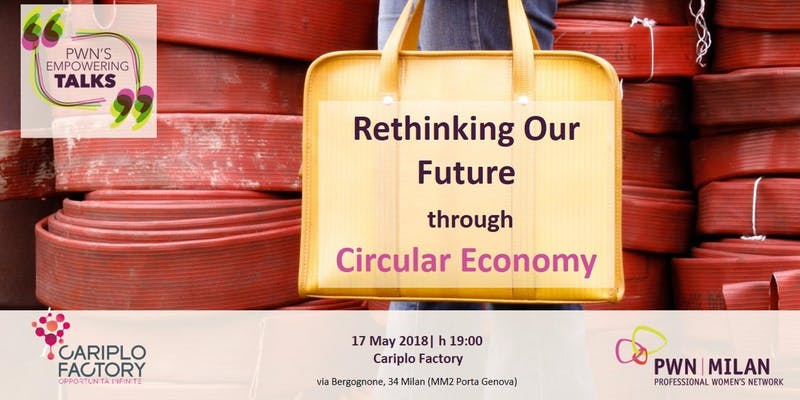PWN Milan’s Empowering Talk Highlights - Rethinking Our Future Through Circular Economy

Another engaging PWN Milan’s Empowering Talk took place on 17th May at Cariplo Factory.
A circular economy is a regenerative system in which resource input, waste, emission and energy leakage are minimised by slowing, closing and narrowing energy and material loops. This can be achieved through long-lasting design, maintenance, repair, reuse, remanufacturing, refurbishing and closed recycling loops. This is in contrast to a linear economy which is a “take, make, dispose” model of production.
A major argument in favour of the circular economy approach is that achieving a sustainable world does not require changes in the quality of life of consumers, nor it requires loss of revenues or extra costs for manufacturers and other economic agents. The argument is that circular business models can be as profitable as linear models and allow consumers to keep enjoying similar products and services.
Andrea Buraschi - great speaker of PWN’s event, famous and recognized Finance/Corporate Finance teacher at the Imperial College of London - introduced PWN’s audience to this topic by showing us a video in which plastic pollution is described as a terrible problem for animals and for us as well.
The social responsibility both of the individuals and both of the firms is crucial and luckily is becoming more and more dominant nowadays.
But the journey has just started.
The circular economy focuses on areas such as design thinking, systems thinking, product life extension and recycling, in order to achieve models that are economically and environmentally sustainable and even more ethical.
One example of a circular economy model is the implementation of renting models in traditional ownership areas (e.g. electronics, clothes, furniture, transportation). Through renting the same product to several clients, manufactures can increase revenues per unit, thus decreasing the need to produce more to increase revenues. Recycling initiatives are often described as circular economy and are likely to be the most widespread models.
There are lots of great examples of circular economy and Andrea showed us two: first, the innovative project of two guys which is called “Ooho Water” - water put in a small ball which is eatable and that eliminates definitively plastic. The second story dealt with Patagonia, a famous well known technical mountain’s clothes brand which started to repair or radical re-act Patagonia’s used clothes or even buy them and selling them out after having re-done and restructured them. A terrific idea that became very famous between the circular economy fans.
The circular economy includes products, infrastructure, equipment and services and applies to every industry sector. It includes “technical” resources (metals, minerals, fossil resources) and “biological” resources (food, fibres, timber, etc). Most schools of thought advocate a shift from fossil fuels to the use of renewable energy, and emphasise the role of diversity as a characteristic of resilient and sustainable systems. It includes discussion of the role of money and finance as part of the wider debate, and some of its pioneers have called for a revamp of economic performance measurement tools.
One of those pioneers is Kresse Wesling, co-founder of Elvis&Kresse - a sustainable fashion manufacturing firm which since 2005 creates stunning lifestyle accessories by re-engineering seemingly useless wastes and combining them with traditional craftsmanship. And gives the 50% to charity associations.
Their mission is incredible and actually enchanted the PWN’s audience. A great initiative that from two young minds managed to do what world needs: transform the waste problem into an opportunity; both for the planet and both for people.
The event closes itself with a panel discussion with Kresse, Enrica Arena (Co- Founder at Orange Fiber), Mikaela Decio (Environmental Sustainability at Mapei S.P.A.), Anna Monticelli (Senior Manager Circular Economy Unit at Intesa Sanpaolo Innovation Center) in which they explained what their firms are doing or are planning to do in order to sustain the world’s health.
Long researches, deep studies, softwares and initiatives, firms are actually doing their best to understand how to deal with preservation and ethic.
But all of us has to start from is own field, from home, from its sigle gestures which can be, even if small, a part of the circular economy.
Micheal Jackson sang: “Heal the world,
Make it a better place, For you and for me
and the entire human race..”
Let’s start then!
Stay tuned and see you at the next event!
Text edited by Alissia Molteni

